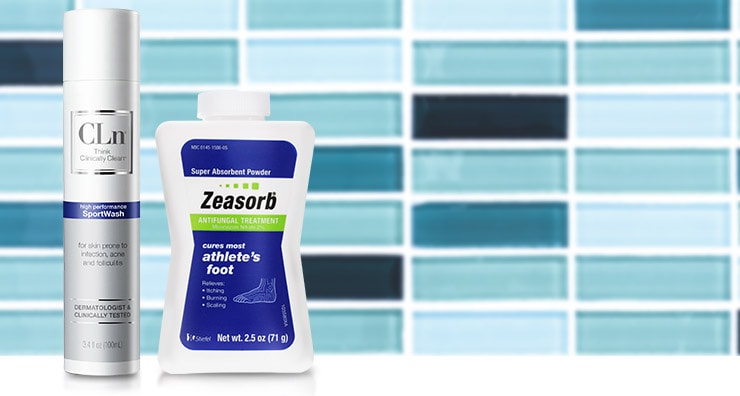
About the Author
Kristen is a copy editor for LovelySkin who loves catching up on the latest in skin care and beauty trends. Her favorite things include cats, concerts and Harry Potter.
Other Posts by KristenWelcome to LovelySkin.com.

You finish your workout and can’t wait to shower but when you check your gym bag, your shower sandals are nowhere to be found. Do you shower anyway with your feet bare or do you wait to shower until you get home?
If you’re the still-shower-barefoot type, you might want to reconsider. Public showers like those found in gym locker rooms and college dorms pose health risks that can easily be avoided by donning a pair of flip flops. Read on to learn more about the dangers of public showers.
You’ve heard it many times before: bacteria, fungus, mold and other germs thrive in warm, moist environments. It’s no different in public showers. In addition to the water running down the drain, public shower floors come in contact with sweat and skin cells from every single person who uses the same shower stall. Sometimes there are even traces of urine on the tiled floor.
If that isn’t enough evidence to change your mind, shower stalls also play host to various strains of mold, algae and fungi that either grow in damp environments or are transferred there from other people’s feet. That’s not including any outside contaminants that might find their way in including E. coli, pesticides, feces and ringworm. If you’re allergic to molds, these pose an additional risk to your health.
This is not to say that public showers aren’t cleaned. The floors of public showers are usually cleaned with powerful detergents to eliminate germs and bacteria. However, not all showers are cleaned frequently and thoroughly enough. If exposed to the same chemicals time and time again, certain strains of bacteria can also become resistant to these cleaning agents.
Even a quick rinse-off shower without shoes can lead to athlete’s foot, a scaly rash that causes itching, stinging and burning between the toes. You’re also at risk for contracting onychomycosis, a fungal infection that causes toenails to become thickened, brittle and hard with a yellow discoloration. If you have even the smallest of cuts on the bottom of your foot, the human papillomavirus could sneak through and cause a painful plantar wart or you could even contract a serious bacterial infection. Many of these issues can be treated with over-the-counter medication, prescription antifungal treatments or prescription antibiotics. Treatment times for each can vary from about a week to several months.
Wearing flip flops to, from and in the shower will help keep your feet free of germs and bacteria. If the spread of bacteria is still a concern, cleansing with CLn products will help. The active ingredient in CLn products is bleach, one of the few antibacterial agents that doesn’t lead to antibiotic-resistant bacteria.
After showering, always dry your feet thoroughly, including in between each toe, with a clean towel. If you’ve had athlete’s foot before, consider applying an antifungal foot powder like Zeasorb Antifungal Treatment Powder for Athlete’s Foot, as well. It’s also a good idea to clean your shower shoes with a disinfectant like bleach and replace them regularly.
How do you protect yourself when using public showers? Share with us in the comments.
Discover the benefits of glycolic acid p...
Here's Why You Should Avoid Using the Sa...
Follow us on social networks and be one of the first to learn about sales, giveaways, and free samples
| Mon - Fri | 9 - 5 p.m. CT |
|---|---|
| Sat (chat only) | 9 - 3 p.m. CT |
| Sun / Holidays | Closed |
| Call or Text: | 402-697-1100 |
|---|